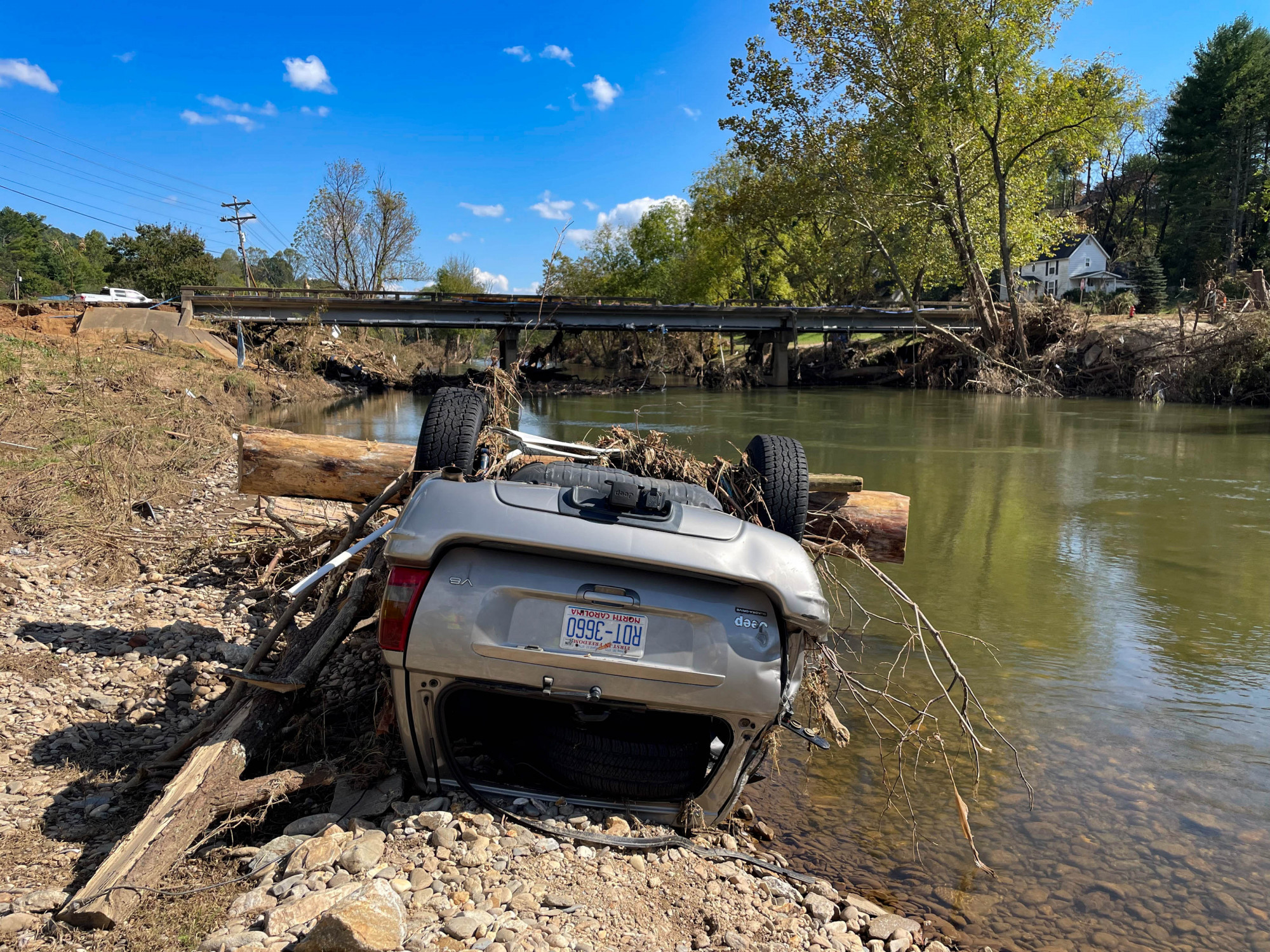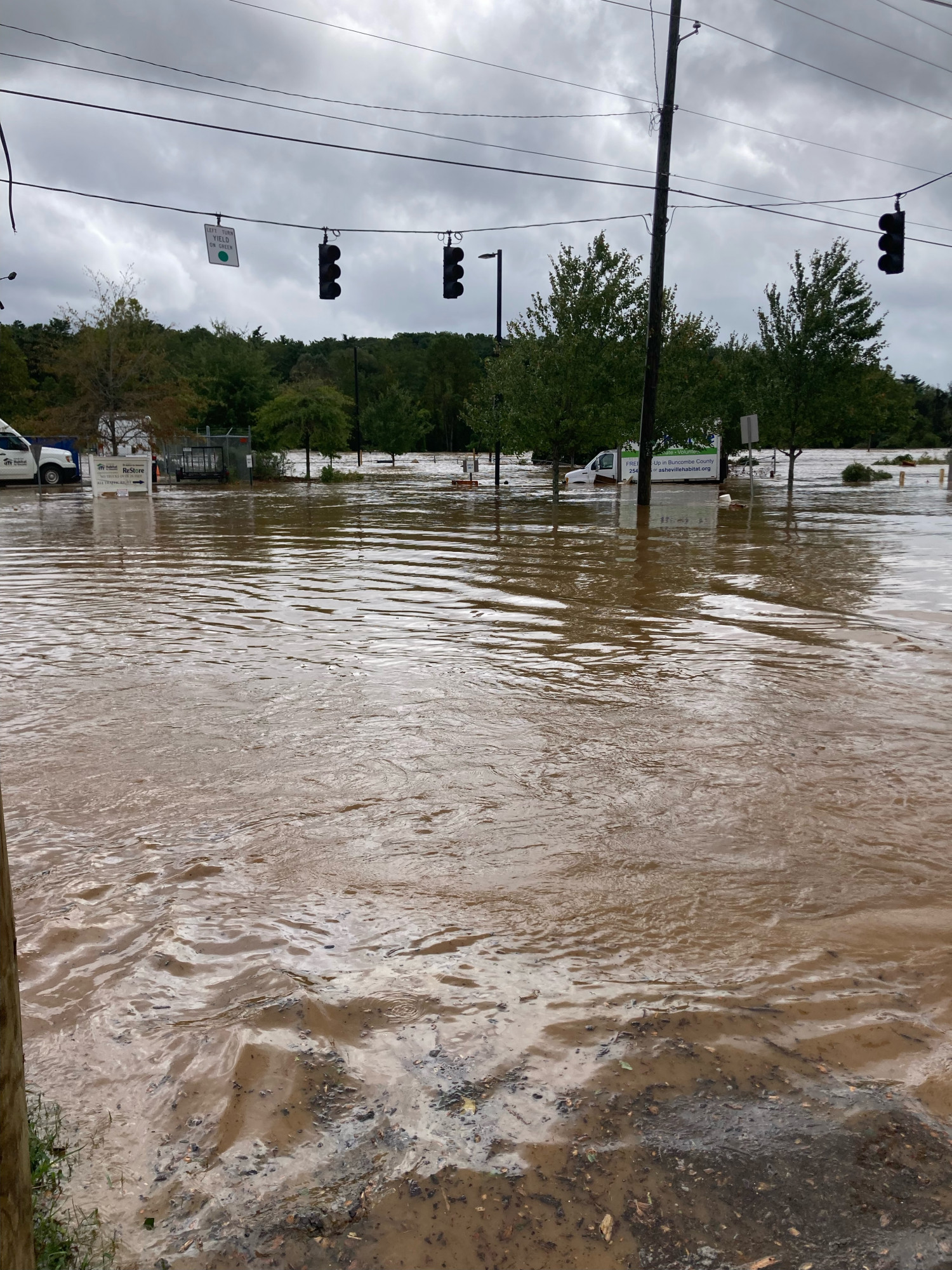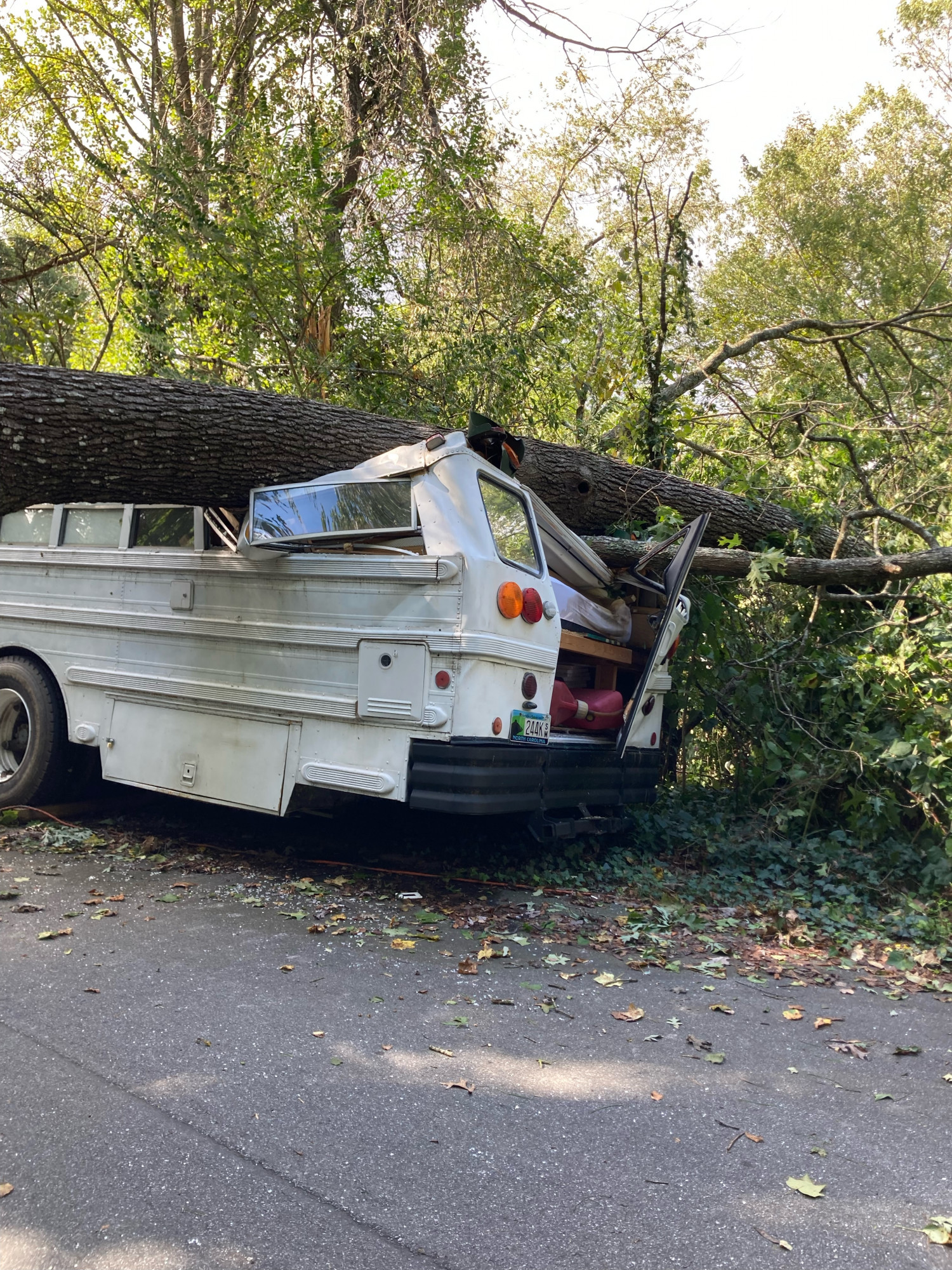
Courtesy of North Carolina Department of Transportation
Life in Asheville After Hurricane Helene
Year of the Bear and Other Claims: A Personal Dispatch from a Destroyed Southern City
By Melanie McGee Bianchi
October 2nd, 2024, marked my only child’s eighteenth birthday, five weeks into his senior year of high school. On that day, hiding my dank long hair under a “Year of the Bear” head scarf—a souvenir acquired during a June camping trip at Lake James State Park—and accessorizing my intermittent stabs of hope with a glow-in-the-dark rosary necklace my twin sister gave me last Halloween, I waited in line at one of Asheville’s few open pharmacies hoping to get a prescription refilled. I needed a bottle of what our last century’s best women writers—Plath, Welty, Sexton, DuMaurier—used to call “nerve pills,” and what North Carolina (and every other American state extant) refers to as controlled substances. Which can sound either prudish and dictatorial or comforting and orderly, depending on what owns you.
Because it wasn’t my regular pharmacy, my request was denied, but it was disgraceful to complain when my new friend—the youngish mother with whom I chatted nonstop during the hour-long wait—was, in real time, losing the middle toe of her right foot. Her hair was loose and pretty and curiously clean. Although she was at least ten years my junior, our kids were pretty much the same age with close-together birthdays. We crowed with pride; we waxed competitively about the sweetness and resilience of our respective offspring.
We decided our kids’ generation has gotten a bad rap. Look at what they were dealing with, first COVID and now this—if we could just keep them thriving, they would certainly be tomorrow’s leaders.
The youngish mother told me her main trouble was neuropathy. I didn’t know what that was, not in precise medical terms, but found out pretty quick it's a nerve complication common with diabetes.
I didn’t want to look down at her exposed foot in its rubber slide sandal. I didn’t want to, but I did, I had to; she asked me to look. We were partners in anxiety, and it was my duty.
I went dizzy for a few moments when I saw the filthy gray rag around the imperiled toe, the bandage purple with dried blood and tied so crudely I thought of a battlefield scene in a Civil War movie. A few of her toe’s siblings were already gone, and the youngish mother was hoping to keep the holdout: this brave survivor.
She was in line for nerve pills, too, although Lord knows what other direly needed medication she must have required to save her toe (and thus, I suspect, her life). I wondered if she would be denied as well, but I didn’t stay to find out. (“Remember,” she told me as we parted, “all we can do is pray.”)

Courtesy of author
Back home, I was dealing with other denials, these decreed by two insurance adjusters from a couple of different states. They were chummy, they were sorry. “I used to watch Night Court, too! What was that one actor’s name, the one who recently died?” But they couldn’t help us with any actual claims for our house.
It’s a small, problematic, sixty-three-year-old cottage in West Asheville, set on a hill, that we bought seventeen years ago, pooling resources as an extended family: me, my twin sister, and my husband, plus our newborn son who sat up on his own for the first time the same hour we signed the contract.
During COVID, we had carpet and sheetrock installed in our underground basement to make this living space actually feel livable. It is here, below grade, where we long ago stowed all our books and records and camping equipment and bicycles.
But our below-grade abode took on six inches of water, and with no electricity to turn on fans and dehumidifiers, the mold that daily creeps up from the baseboards is quite close to the paint color I chose for these now-ruined rooms.
We are not buried under the mud as others, unthinkably, are. We are toting heavy camping containers full of toilet-flushing water up our dicey concrete steps, water gathered from secret places. We are alive: deliriously, irritably alive. One of us is getting thinner from chronic digestive upset. One of us can’t sleep from fretting over house, job, and future. One of us is tortured by untreated eczema.
According to family legend, when my sister and I were born seven weeks premature in 1971, two little sacks of surprise cornmeal, our father ran petrified out of the small-town hospital waiting room to place bets at the horse track across the street—“Twins? Christ Almighty! We’re going to need more money!” Now almost seventy-nine, he lives in the suburb of Oakley, east of Asheville, in a Section 8 complex for disabled seniors.
He is mentally sharp but afflicted with rheumatoid arthritis. He uses a flip phone to contact his bookie but does not use the cane his RA specialist sternly suggested—not as long as he can limp up to the convenience store and back every day for his two forty ounces of Olde English.
At his apartment building, eccentricity seems to be either a prerequisite for tenancy or collateral fallout, and on our way back the other day from dropping him off a sack of sardines and peanuts, we ran into one of his fellow residents. A cheerful soul, this fella was liquored up to the eyeballs and lounging in a lawn chair under an ancient buttonwood tree that had survived the chaos. Visibly unconcerned, he offered us a fair price for two bear cubs he claimed to have tied up in his bedroom.
I’m not sure how North Carolina decided that 2024 was the Year of the Bear, but the local ursine population somehow got wind of the branding. Including sightings on family hikes this spring and summer and the expected urban garbage can raids, I’ve never seen more black bears in my thirty-plus years living in the Blue Ridge Mountains than I have in the first three quarters of 2024.

Courtesy of author
Last winter, for the Oxford American, I wrote a story about eighth- and ninth-generation a cappella vocal performers. In that story, I mentioned the placidity of the French Broad River during last year’s dry summer and fall, but also its capacity for particularly nasty turns of mood, proven by the then-watershed event of the Great Flood of 1916 and other, more modern deluges, the second-worse being in 2004.
Well, Helene washed away 1916 like one of the Four Horsemen of the Apocalypse had it harnessed to his to-do list. Last week someone on public radio called Helene Southern Appalachia’s “500-year flood.” This week the catastrophe got upgraded to a 1,000-year flood.
That’s medieval, if not quite Stone Age. But there’s still plenty of time to hope for an even loftier title.
They say we won’t have running water for at least four more weeks. That puts livability sometime around November 1st—the Day of the Dead, the start of the holiday shopping season, the deadline for the first round of college applications for North Carolina’s high-school seniors, the beginning of the overwintering period for Southern-mountain black bears, and the time of year when sandals are put away for more practical shoes and all toes must be protected by prayer or medicine or something far more prosaic and prone to ruin, like socks.




